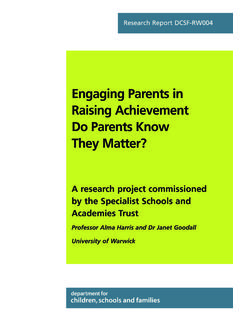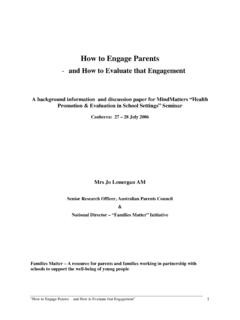Transcription of RoSPA - Play Scotland
1 Play ScotlandMidlothian Innovation CentrePentlandfieldRoslin EH25 9 REScottish Charity Number SC029167 Company Number 017785 Tel: 0131 440 9070 Email: information on Play Scotland including our Parents & Families Section and our KidsZone can be found at can now follow Play Scotland on Twitter and PlayRoSPAWe would love to see your photos of your children involved in Play. These can be emailed to Climbing trees and falling out of them is all part of growing up and having small injuries helps children learn about risks Benefits of riskPlay comes naturally to children as part of their physical development involves them engaging in play which they find challenging, risky and sometimes even scary! Telling a child about possible play dangers is not the same as experiencing and learning from them. If you tell a young child, for example, don t touch, that is hot they won t know what that word means unless they actually experience it. You will find then that they won t touch that item again!
2 Children taking a risk when playing, is them simply pushing their own boundaries and learning (as well as having fun!).As parents/carers we have all experienced that heart in the mouth feeling when you see your child climbing a tree/climbing frame, riding their bike/scooter fast and you want to run to protect them. But if we wrap them in cotton wool they will never be able to climb trees or ride their bikes confidently. If we are over protective we harm our children because they will not get to learn about risk and how to manage you remember what it was like to stand at the bottom of the tree, watching your friends climb up and thinking that looks too high for me . And then that sense of achievement when you try it and accomplish that mammoth climb! Or sitting at the top of that high wall, and thinking, I WILL dreep down this all great memories of our childhood!Adult restrictions on children s risky play can create situations where children will look else-where, often to seriously dangerous situations, to get the excitement they might otherwise find through play.
3 Attempting to remove all risk from play for children may be damaging, if children are not allowed to take risks when playing they may grow up over-cautious or be unable to judge potentially dangerous situations. A degree of risk, properly managed, is not only inevitable, but positively desirable (Tim Gill, Nothing Ventured)Interviews with children have shown that they engage in risky play to experience positive emotions such as fun, enjoyment, thrill, pride and children are different, and not all seek out risky play. Some children will not leave their comfort zone and others seek the thrill of challenging themselves more. Every child will attempt the risk they feel comfortable with, and they don t always require extensive adult play space can be seen as risky, depending on the age, skill and size of each child. Every day life involves a degree of risk, and as parents we don t always realise how much our children are learning when they manage these you know that Risky Play helps children:References1 Coster and Gleeve, 2008 A child loves his play, not because it s easy, but because it s hard.
4 Benjamin Spock (American Pediatrician, 1903-1998)In 2012, the Health & Safety Executive (HSE) issued a High Level Statement on Play Children s Play and Leisure Promoting a balanced approach. This is a positive statement which supports striking the right balance between protecting children from the most seri-ous risk and allowing them to reap the benefits of play. Helping young people to experience risk and learn how to handle it is part of preparing them for adult life and the world of work. Judith Hackitt, Health and Safety Executive Chairdevelop both mentally and physicallywith their social developmentsolve problemsnurture their curiositydevelop independence and their own confidencelearn their own capabilitiesdevelop balance and coordinationdevelop emotional resiliencekeep healthy and reduce obesityincreases academic performanceto develop own self esteemhave fun!!












